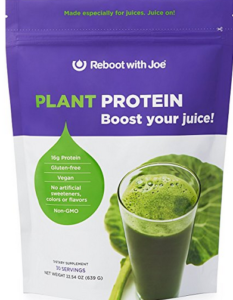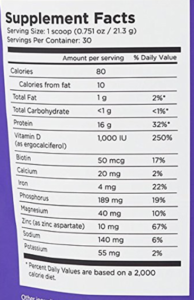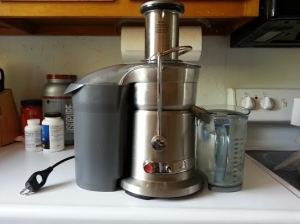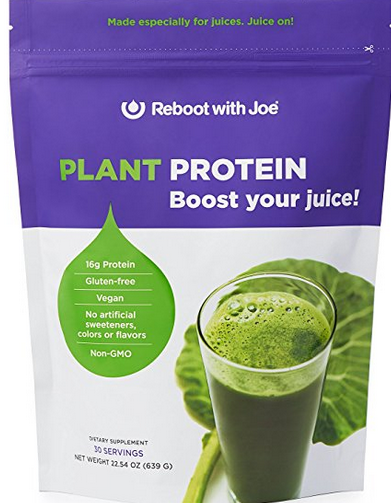How Much Protein?
The table above tells us that each scoop of Reboot Protein provides 16 grams of protein. The label tell us that this provides 32% of our Daily Value for protein, but I think this percentage can depend. The National Institutes of Health tells us that the Daily Value for protein is set at 50 grams per day. But protein intake can vary according to many things. Because we are all different, I would not take “32% DV” as gospel for everybody. That said, 16 grams is a respectable amount of protein.
It should also be remembered that fruits and vegetables that make up your juice, will also have some protein as well.
Reboot Protein Ingredients
From the label, we are told that the ingredients are, in order, as follows:
- Pea protein isolate
- Rice protein concentrate
- Silica
Pea protein contains all the essential amino acids needed to stay healthy including the branch chain amino acids (leucine, isoleucine and valine). Leucine, in particular is of interest to researchers because of its ability to stimulate muscle protein synthesis (fancy talk for muscle growth). This is why you may have seen bodybuilding supplements highlighting their leucine content. Leucine also helps us make a metabolite called “HMB.” See the Ensure review for more on that.
One study noted that 90 grams of pea protein given for 12 weeks resulted in similar biceps muscle thickness compared to whey protein, when  combined with exercise. Strength improvements between pea protein and whey protein were not different.
combined with exercise. Strength improvements between pea protein and whey protein were not different.
Rice protein also has all essential amino acids and my guess is rice was chosen because it complements those amino acids in pea protein and vice versa.
In other words, pea protein adds what rice might be low in and rice adds what pea protein might be low in. In other words, together, they might provide a more better overall amino acid profile, similar to eating fish or chicken for example.
One study noted that 48 grams of rice protein improved body composition and exercise performance as well as whey protein when given to college age men for 8 weeks.
The label does not indicate if the rice used comes from brown rice or white rice.
Silica (basically sand) is sometimes added to supplements to prevent powders from clumping together. My guess is this is why it's present. I've seen silica in other supplements. Silica is the final ingredient listed so it's present the least.
Is It A Supplement Or A Food?
I can understand how this might be a murky issue for some. Even though the ingredients come from food, I think Reboot Protein is  a dietary supplement (rather than a “food”) because it's meant to be added (supplemented) to juices that are made from food. The product nutrition label also says “Supplement Facts” rather than “Nutrition Facts” which normally accompanies foods. Regardless, this isn't a big issue for most people.
a dietary supplement (rather than a “food”) because it's meant to be added (supplemented) to juices that are made from food. The product nutrition label also says “Supplement Facts” rather than “Nutrition Facts” which normally accompanies foods. Regardless, this isn't a big issue for most people.
Who Makes Reboot Protein?
The product label tells us that the company is called Reboot With Joe LLC. They are located at 99 University Place, New York, NY 10003. A quick online search reveals several businesses with this address. The building itself can be seen if you google the address. My guess is many companies have office space at this location. I do not believe this location is where the plant protein is made. Rather, I think it might just be the business address.
From the TOS page of the Reboot With Joe website, we can see another company called Reboot Holdings Pty Ltd which is located at Kent Street 207 2000 Sydney New South Wales – Australia. That makes sense since Joe Cross is from Australia.
How Does It Taste?
I did not taste the Reboot With Joe Protein for this review. But, from the reviews online, some liked the taste while others thought it was so so.
The taste would probably depend on the type of juice you were making. In other words, adding some fruit to the juice might make the protein powder taste better than if you were just juicing vegetables.
Leave a comment below to let me know what you think of the taste.
How Much Does It Cost?
The supplement costs between $20-$35 (USD).The price will likely fluctuate so what I saw may be different than what it is when you look.
Which Juicer is Best?
If you want to start juicing, you have a lot of options. The brand Joe Cross used in the Fat Sick and Nearly Dead documentary was from Breville. It's also the type I own. Here's my review of the Breville Juice Fountain.
No matter what machine you use, just remember, Reboot Protein is to be added to the juice after you make it. Don't add the powder to juicer itself or it will likely clog it up.
Does Juicing Help Weight Loss?
If you are only drinking juices all day, I'm pretty sure you will lose weight. If you watched the Fat Sick and Nearly Dead documentary, Joe Cross -and those he encounters on his journey – do indeed lose weight. This is not because juicing helps people consume fewer calories. This is how all diets work. All weight loss plans work.  I believe this is even true for the popular HCG diet which I've previously looked at.
I believe this is even true for the popular HCG diet which I've previously looked at.
Any Juicing Side Effects?
For healthy people, side effects are unlikely especially if you just drinking a couple of juices a day.
- For long term juice fasts lasting several weeks or more – getting adequate nutrients might be an issue. Getting a broad spectrum of nutrients by juicing a variety of fruits and vegetables is necessary for long term juice fasts.
- Juicing removes fiber. The lack of fiber can cause a spike in blood sugar if your juice has lots of fruits. This can be a problem for those with diabetes.
- Since our gut bacteria (probiotics) like to eat fiber (fiber is a prebiotic), lack of fiber might alter gut microbiota in some people. How significant this might be is unknown. For those who are eating foods along with making juices, then this should not be an issue.
- During juice fasts, some people might get headaches which can happen anytime we reduce calorie intake.
- People taking blood thinners should talk to their doctor. Vitamin K in fruits and vegetables may interfere with anticoagulant medications.
Does It Help The Body Heal Itself?
Some juicing websites might say that going on a juice fast every so often gives the body time to recover and recuperate from the daily grind of eating solid foods. There is no evidence that healthy people needs time to recover from eating food. If it did, our ancestors would have been in big trouble before juicers were invented.
Juice Only Organic Foods?
Juicing can get expensive. Just watch out fast you go through fruits and vegetables once you start. Organic foods tend to cost more than non-organic foods. Because of this, if it's not in your budget, I say don't worry about whether the foods are organic or not.
Yes, organic foods might have fewer pesticides but the research is overwhelming that people who eat more fruits and vegetables are healthy. The research doesn't really say those foods have to be organic. I bring this up because I want people to be healthy and still be able to pay their rent.
The Environmental Working Group does maintain a list of the “Dirty Dozen,” the foods that contain the most pesticides. For those who want to do more, either cut back on juicing lots of those foods, or choose organic versions if you can afford it. Here is their list of “The Clean 15” also.
Reboot Protein Powder: Yes Or No?
Do you need to add protein powder to juices? On one side, vegans will say that you can get all the protein you need from fruits and vegetables. If you are making one or two juices a day -and still eating solid foods that include protein – then you probably don't need this supplement. For those who are doing a 100% juice fast diet, then maybe, the added protein might help you. For what it's worth, in the Fat Sick and Nearly Dead documentary, Joe Cross only juices fruits and veggies. I didn't see him add protein powder to his juices.

Hi Joe, I am new to your products and documentary, I am really impressed.
I am looking forward to doing the juicing however my budget right now is not allowing me this new and exiting venture.
I have done so many things to loose the weight and it still on me. I stopped eating red meat, pork, chicken a while back and have not lost a pound. I work, mother of three my husband has not had luck these days of finding work so he is at home. I still cook for them my older children are out of the home and I have one more child, down syndrome that will never leave.
I have a problem keeping her from not eating so much junk, and it’s been a struggle I am not with her 24/7 and that is where the problem lies. I would love to start juicing at least 15 days however I will have to wait until I am able. you truly are an inspiration to me thank you for doing the documentary fat,sick and dying.
Hi Yolanda, I thank you for writing but I must tell you that I am Joe Cannon – not Joe Cross, of the documentary. This is my website and I have no relationship to that Joe or his company. I simply reviewed his protein supplement, which I hope you found useful.
While I also found the Fat Sick and Nearly Dead documentary inspiring, I dont think you need to start juicing to lose weight. Remember it really is all about reducing calories. What have you been eating? chicken, meat etc, is not necessarily bad from a calorie stand point and you do need some protein as you try to lose weight. If you are still eating things like pasta, rice, cookies, cakes, muffins and things like that, Id cut back on those and focus more on eating vegetables fruits and lean protein like chicken.
Juicing can be expensive, depending on where you buy your fruits/veggies and given that your husband is out of work, Id rather you buy those foods and eat them, for now, rather than juicing them. The fiber in the foods will help you stay full, and there is lots of research on fiber helping weight loss.
I hope some of this helps Yolanda. if you have any other questions, just ask and Ill try to help.
I also never heard of this before! Thanks for saving me the time to research this myself!
Hi Patrick, anytime!
interesting stuff. I also never heard of protein to be added to juices either. Thanks for the heads up on this product.